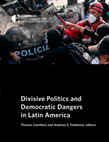Papers by Andreas Feldmann
este ensayo revisa los principales acontecimientos políticos ocurridos en Haití durante los últim... more este ensayo revisa los principales acontecimientos políticos ocurridos en Haití durante los últimos 22 meses. durante este período Haití ha logrado cierto grado de estabilización política gracias a la realización de comicios y la posterior elección de rené preval como presidente. el país ha logrado algunos avances en materia de seguridad y ha estabilizado su economía, la que creció moderadamente. Los avances han sido posibles, en parte, gracias a la presencia de tropas de la misión de estabilización de las naciones unidas en Haití (minustaH) que han colaborado con las autoridades en diversas áreas claves, sobre todo en materia de seguridad. más allá de los aspectos positivos, la situación general de Haití sigue siendo extremadamente crítica dado los graves problemas estructurales que enfrenta el país y a su apreciable dependencia de la comunidad internacional.
Routledge eBooks, Aug 24, 2022
San José, C.R. : PEN eBooks, 2021
International Affairs, 2019
Carnegie does not take institutional positions on public policy issues; the views represented her... more Carnegie does not take institutional positions on public policy issues; the views represented herein are those of the author(s) and do not necessarily reflect the views of Carnegie, its staff, or its trustees.
Revista De Estudios Sociales, 2017
Como citar: Purcell, Fernando y Andreas E. Feldmann. 2017. “Presentacion: Espacios y circulacione... more Como citar: Purcell, Fernando y Andreas E. Feldmann. 2017. “Presentacion: Espacios y circulaciones. Nuevas miradas desde las ciencias sociales en America Latina”. Revista de Estudios Sociales 61: 8-12. https://dx.doi.org/10.7440/res61.2017.01 Hace poco mas de diez anos, los sociologos Mimi Sheller y John Urry (2006, 209) acunaron la idea de que en las ciencias sociales se estaba estableciendo un paradigma asociado a las “nuevas movilidades”. Recurriendo a la moda academica anglosajona de ento...
Haiti continues to be an extremely fragile democracy in a state with minimal capacities to perfor... more Haiti continues to be an extremely fragile democracy in a state with minimal capacities to perform basic state functions. Haiti depends and will continue depending on the United Nations Stabilization Mission in Haiti (MINUSTAH) and the international cooperation to keep its process of political stabilization, state building, democratic strengthening and achievement of economic and social development to a sustainable level. The René Préval government, with strong international support, has achieved important improvement in security, planning and institutional building. The year 2008 was marked by a deep crisis in the government, triggered by the sudden hike in international food prices, severe conflicts with the opposition and natural disasters caused by tropical storms and aggravated by the environmental devastation.
La nature fragile de l'État avait déjà fait de l'émigration un aspect essentiel de la vie haïtien... more La nature fragile de l'État avait déjà fait de l'émigration un aspect essentiel de la vie haïtienne même avant que le séisme ne déplace des centaines de milliers de personnes.
Dame. They both work as consultants for the Special Rappor teurship on Migrant Workers and Their ... more Dame. They both work as consultants for the Special Rappor teurship on Migrant Workers and Their Families at the Inter-American Commission on Human Rights. A previous version of this article appears in Neve Gordon (ed), 2004, From the Margins of Globalization: Critical Perspectives on Human Rights (Lanham: Lexington Books). The authors wish to express their gratitude to Neve Gordon and Lynne Hinojosa for the valuable help they provided in preparing this article, and to Juan E. Méndez for his mentorship. The opinions expressed in this article only reflect those of the authors and not those of the Inter-American Commission on Human Rights (IACHR).

Divisive politics have hit many Latin American countries hard in recent years, fueled by numerous... more Divisive politics have hit many Latin American countries hard in recent years, fueled by numerous underlying fissures and issues including economic inequality and exclusion, corruption, ideological differences, high levels of violence, and chronically weak state capacity. The coronavirus pandemic has only intensified these pressures. Latin America thus enters 2021 shadowed by an ominous sense that democracy is under extraordinary strain.<br> To help shine a light on these troubled waters and chart the risks ahead, this collection of essays by a notable set of regional experts examines recent developments in six key countries: Bolivia, Brazil, Chile, Colombia, Mexico, and Peru. Taken together, the different country accounts present a sobering picture, though not an unrelievedly negative one. Divisions are deep, economic troubles are widespread, and the pandemic continues to devastate the lives of countless people in the region. The risks for democracy are serious, ranging from ...
The fragile nature of the state had turned emigration into a major feature of Haitian life even b... more The fragile nature of the state had turned emigration into a major feature of Haitian life even before the earthquake displaced hundreds of thousands of people.
Forced migration review, 2013
The fragile nature of the state had turned emigration into a major feature of Haitian life even b... more The fragile nature of the state had turned emigration into a major feature of Haitian life even before the earthquake displaced hundreds of thousands of people.

New Migration Patterns in the Americas, 2018
This chapter explores the paradigmatic case of Michoacan, Mexico, a model transnational state wit... more This chapter explores the paradigmatic case of Michoacan, Mexico, a model transnational state with intense social and economic interconnections with the United States suffering very high levels of violence. It investigates how insecurity resulting from criminal-related activities and the concomitant reaction on the part of the Mexican state and self-defense groups has forcibly displaced thousands of people, critically reshaping the state’s migration patterns, such as with the rise of internal displacement. Relying on interviews with migrant authorities and representatives of civil society both in Mexico and the United States, this chapter traces the effect that violence is having on traditional migration patterns showing how an important number of uprooted Michoacanos have attempted to migrate north using existing transnational migration networks. The analysis thus underscores the complex intermestic dimension that human mobility is attaining in the North American corridor.
Revista de Estudios Sociales, 2017








Uploads
Papers by Andreas Feldmann